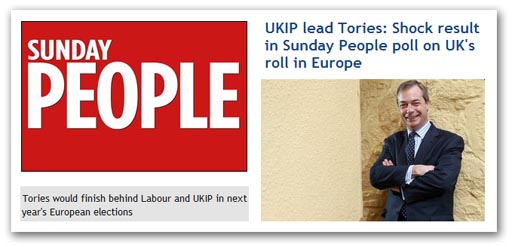An illiterate headline in the Sunday People launches a ComRes poll on voting intentions in next year's EU parliament elections. To no great surprise, 35 of those polled opted for Labour, 23 percent for UKIP and 22 percent for the Conservatives. The Lib Dems polled a dismal eight percent.
However, what is probably far more significant – pointing to the reason for the great angst amongst the Conservatives - is a finding that a significant tranche of UKIP support (37 percent of a sample size of 304) - sloughs away if Mr Cameron offers an "in-out" referendum on the EU.
This finding has Tory Diary's Tim Montgomerie commenting that, "Unless Cameron commits to an In/Out vote in his looming speech, I can't see how we are going to begin to cap the Farage phenomenon".
As to a referendum, the ComRes poll records 63 percent of its sample in favour of holding one, down from the last poll fifteen months ago when 68 percent favoured an "in-out" referendum. And, according to the poll, 42 percent would vote to stay in the EU, compared with just 33 percent intent on leaving, giving a clear majority to the "inners".
Predictably, treaty renegotiation gets more support than a straight "out" option, with 42 percent in favour, compared with 41 percent in 2011. And a clear sixty percent oppose the idea of Britain joining the euro, even if the debt crisis is solved.
From an Opinium poll in The Observer, though, we get a more nuanced picture, with only 25 percent of respondents believing that Cameron could claw back powers from the EU, as opposed to 47 percent who believe this unlikely.
Here, the finding are more encouraging for the "outers", with the poll having 53 percent of respondents believing the UK should withdraw from the EU if Cameron could not negotiate a significant return of powers, compared with 19 percent who would want to remain in.
As to a referendum, the ComRes poll records 63 percent of its sample in favour of holding one, down from the last poll fifteen months ago when 68 percent favoured an "in-out" referendum. And, according to the poll, 42 percent would vote to stay in the EU, compared with just 33 percent intent on leaving, giving a clear majority to the "inners".
Predictably, treaty renegotiation gets more support than a straight "out" option, with 42 percent in favour, compared with 41 percent in 2011. And a clear sixty percent oppose the idea of Britain joining the euro, even if the debt crisis is solved.
From an Opinium poll in The Observer, though, we get a more nuanced picture, with only 25 percent of respondents believing that Cameron could claw back powers from the EU, as opposed to 47 percent who believe this unlikely.
Here, the finding are more encouraging for the "outers", with the poll having 53 percent of respondents believing the UK should withdraw from the EU if Cameron could not negotiate a significant return of powers, compared with 19 percent who would want to remain in.
Despite this, Andrea Leadson and her "Fresh Start" group -supported by Open Europe - still want Cameron to renegotiate. Later this week, she will call for the repatriation of more than 130 powers which are claimed to be vital to retain "national democratic accountability", to "protect British interests and resist the rise of the EU superstate".
Nevertheless, out in the real world, the indications are that anti-EU sentiment is soft. There was, according to the Optimum poll, "a strong feeling" that people could support continued membership of the EU if it could be shown to have economic benefits. Two out of five (41 percent) agreed that being a member of the EU was a price worth paying if it benefited the economy, while only 30 percent disagreed.
On general voting sentiment, incidentally, Labour are on 41 percent, the first time they have passed 40 percent since the end of October, while the Conservatives rise to 31 percent after over a month of being on 29 percent.
A straw in the wind for UKIP has it dropping back to 12 percent, ending its recent surge but still putting them five points ahead of the Lib Dems, who drop to 7 percent , the lowest figure Opinium have ever recorded for the party. Real election results, however, tend to give a different picture.
Altogether, on the EU front, these mixed results show there is everything to play for. Give a strong pro-EU campaign, the indications are that the europhiles could carry the day.
COMMENT THREAD
Nevertheless, out in the real world, the indications are that anti-EU sentiment is soft. There was, according to the Optimum poll, "a strong feeling" that people could support continued membership of the EU if it could be shown to have economic benefits. Two out of five (41 percent) agreed that being a member of the EU was a price worth paying if it benefited the economy, while only 30 percent disagreed.
On general voting sentiment, incidentally, Labour are on 41 percent, the first time they have passed 40 percent since the end of October, while the Conservatives rise to 31 percent after over a month of being on 29 percent.
A straw in the wind for UKIP has it dropping back to 12 percent, ending its recent surge but still putting them five points ahead of the Lib Dems, who drop to 7 percent , the lowest figure Opinium have ever recorded for the party. Real election results, however, tend to give a different picture.
Altogether, on the EU front, these mixed results show there is everything to play for. Give a strong pro-EU campaign, the indications are that the europhiles could carry the day.
COMMENT THREAD
